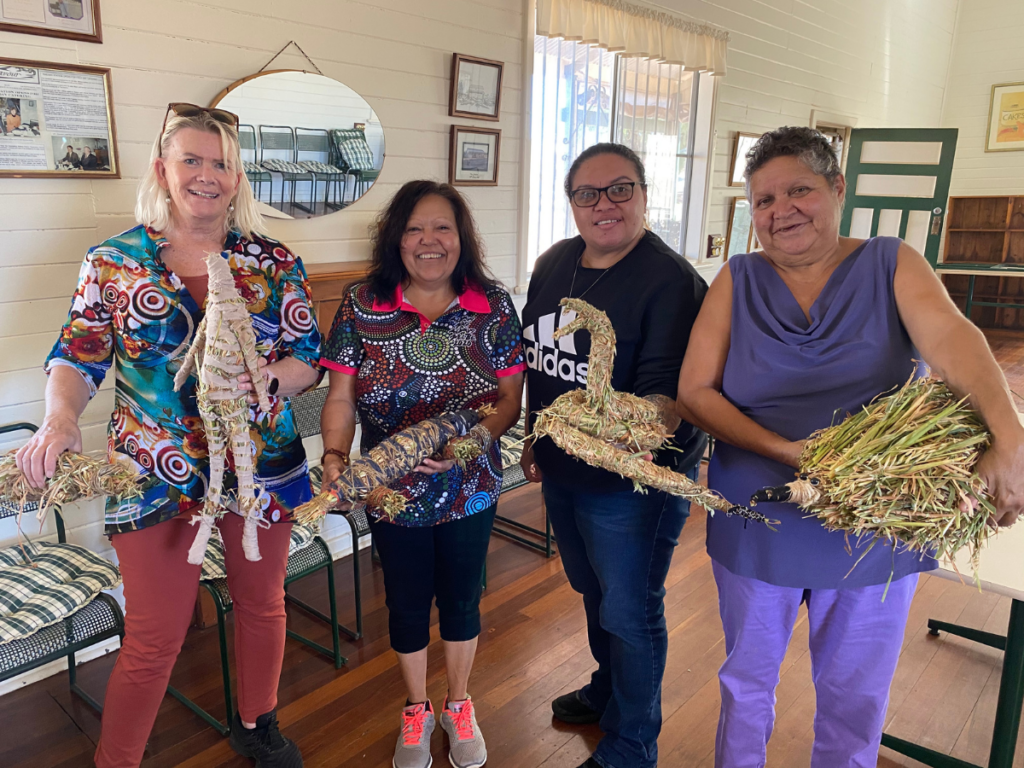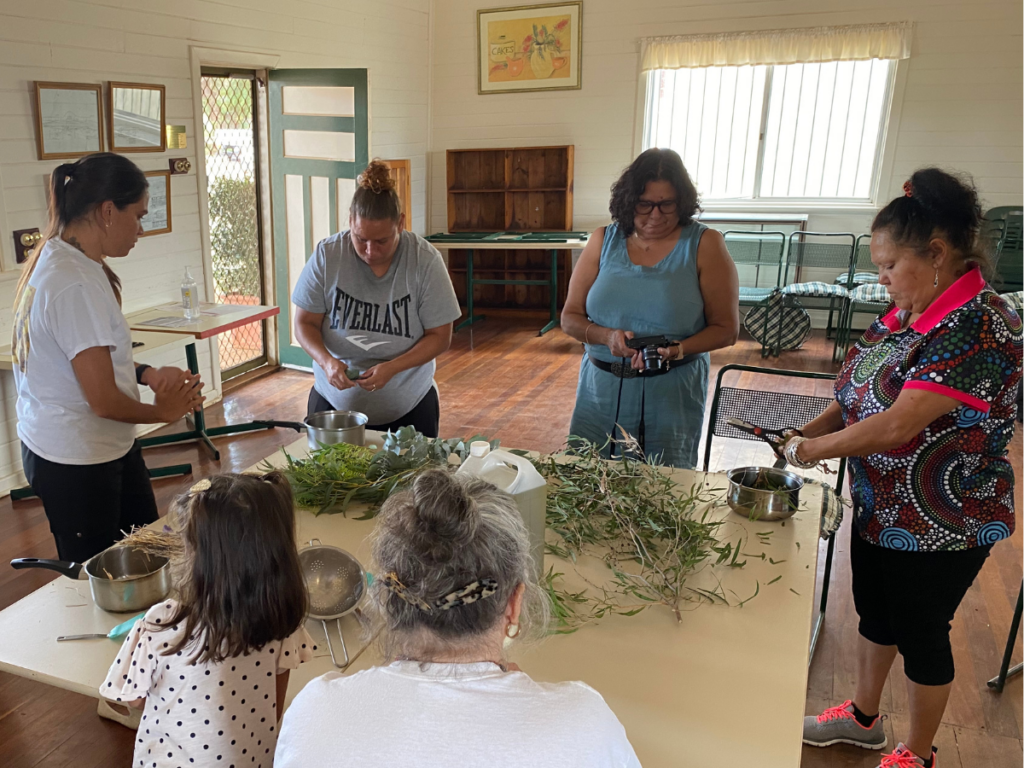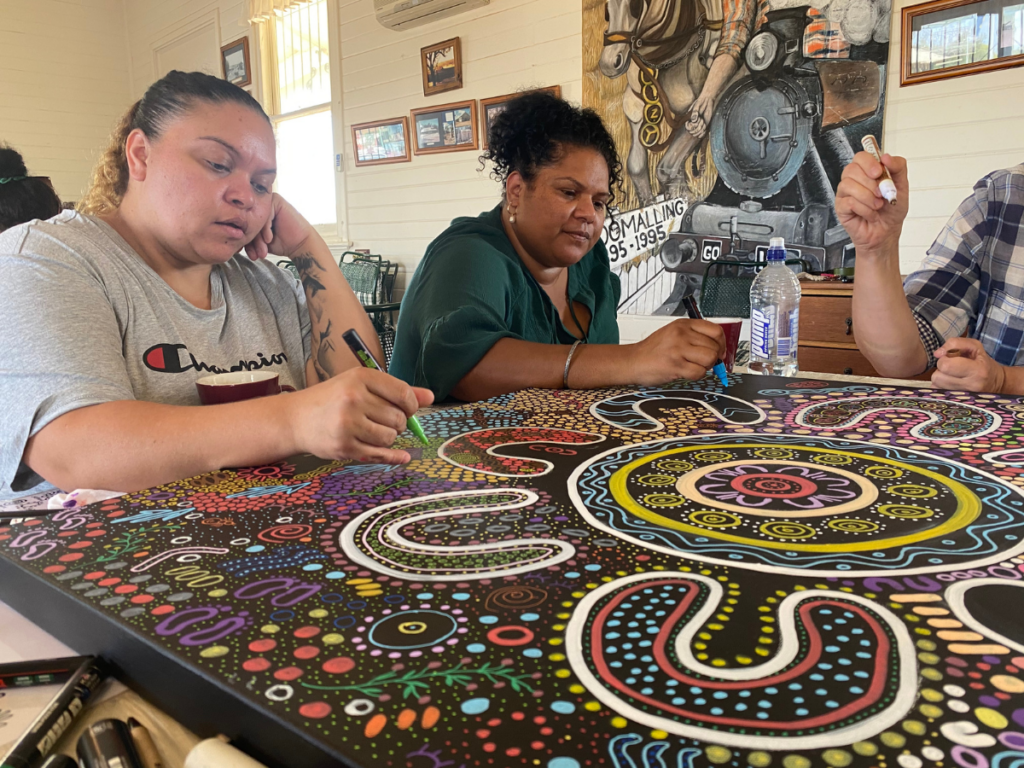Foundation for Rural & Regional Renewal (FRRR)
Workshops for women
Goomalling Aboriginal Corporation in the Wheatbelt region of Western Australia, used their $19,605 In a Good Place grant, funded by CCI Giving for their project called Maangart Yorga (Jam Tree Woman) – a workshop series delivered over the course of a year to impart both traditional and life skills to Aboriginal women and girls.
The program was created for Aboriginal women experiencing poverty, isolation, domestic violence and mental health concerns, and Aboriginal girls, from twelve years old, who are at risk. The program aimed to increase social participation by providing relevant and culturally appropriate workshops and a culturally safe space for connectedness. The workshops enabled the re-emergence of yarning circles and connection to Country that has helped foster relationships with young Aboriginal girls and Elders and provide an ongoing support network.
Maangart Yorga was an initiative to provide a safe space for women and girls to come together, learn, share and connect. Delivered through a series of workshops over a year, the aim was to increase participation in social activity, enhance the sense of community connectedness, improve outlook and help participants make healthier choices.
The workshops included a wide variety of traditional art, yoga and meditation, and health and wellbeing presentations. A series of practical skills sessions and workshops were held for women to have greater confidence, such as:
The organisation reported that participants would come to the workshop filled with apathy, tiredness or stressed, but always left feeling fulfilled and empowered after each workshop. The workshops provided a set of skills that can be transferred amongst the community.
While the workshop roll-out was interrupted by maternity leave for the program manager, the silver lining was that her leave coincided with movement restrictions due to COVID, so there was no additional impact from the pandemic.
Sadly, participation rates were lower than expected due to deaths in the community of two female elders and the suicide of two young Aboriginal men. Grieving periods were long and resulted in non-attendance from some members. For some members, the Maangart Yorga was a saving grace and gave them something positive to focus on.
Overall, 16 women participated across the program (including 2 non-Indigenous ladies), with a good cross section of ages from 21 years to 61 years old. Four female Aboriginal facilitators, three local female non-Indigenous facilitators, and two local female-owned food businesses also benefited from the project.
The greatest success of the program was providing a consistent and safe space for women to meet and yarn about their experience, which assisted healing and created lasting connections. The group plans to continue to meet monthly to use some of the skills they’ve learned and to continue connecting with each other. The Council is working with the Goomalling Aboriginal Corporation to create a permanent space for the women to take ownership of so they can create and share culture.
Storytelling is a vital part of Aboriginal and Torres Strait Islander culture, allowing beliefs and concepts to be passed on through generations. JUTE Theatre Company (JUTE) uses theatre performance and workshop participation to present professional role models and positive stories about a range of Indigenous experiences and possible futures.
Founded in Cairns in 1992, JUTE helps Indigenous students feel valued and connected, by letting them see their cultures and stories represented on stage. There are also longer-term benefits in employment and post-school options for young Indigenous people. Since the beginning of its Dare to Dream program, JUTE has impacted over 6,000 young people and community members in remote parts of North Queensland with more than 3,600 young people taking part in skills development workshops.
With the support of a $15,000 ANZ Seeds of Renewal grant, JUTE was able to take its 2019 show, The Longest Minute, to 10 North Queensland schools in Lockhart River, Bamaga, Mapoon, Mossman, Ravenshoe, Yarrabah, Mt Isa, Doomadgee and Cloncurry – all very remote locations with significant numbers of Indigenous students. The Longest Minute is a story about the 2015 National Rugby League Grand Final, won by local heroes, North Queensland Cowboys in a nail-biting finish.
The funding helped JUTE refine its school program to meet a broad range of needs across artists and facilitators, community, schools and students.
“It was fantastic,” said one of the Mapoon teachers. “The acting was incredible, and it offered our students an opportunity to see successful Indigenous people who are proud of their identity performing at their best. This is something we don’t have easy access to, being so remote.”
The National Remote Indigenous Media Festival is First Nations Media Australia’s major industry event celebrating achievements and supporting the training of the remote Indigenous media sector. Each year the festival location alternates between remote desert and coastal communities to make it as accessible and relevant for its participants as possible. With the annual change in locations comes the need to source funding.
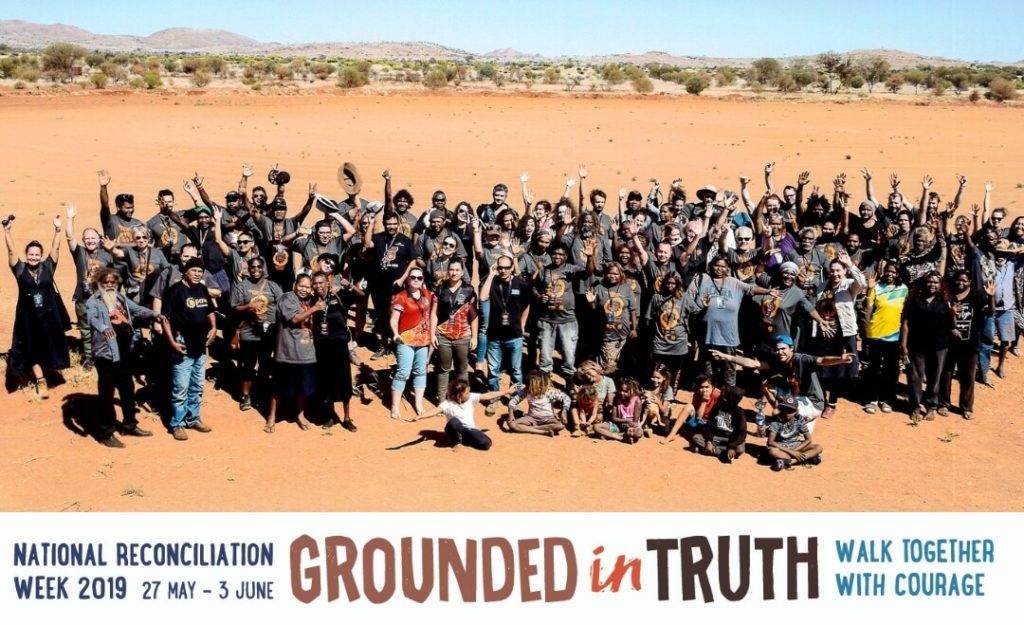
First Nations Media Australia, formerly known as the Indigenous Remote Communications Association is the peak body representing and supporting the media and communications needs of remote Aboriginal and Torres Strait Islander people.
The organisation advocates for community-focused broadcasting, providing tools, networks and resources to support Indigenous media organisations and workers to upskill and build their capacity.
First Nations Media Australia secured $5,000 from FRRR’s Small Grants for Rural Communities program, funded by The Pratt Foundation, to purchase iPads, mobile phones and software to help deliver one of the 2017 festival’s key workshops, Working with Mobile Devices.
More than 100 remote Indigenous media outlets and industry partners from across Australia gathered in the community of Irrunytju (Wingellina) on Ngaanyatjarra country – about 1,700 kilometres north east of Perth near the borders of Western Australia and South Australia for an action-packed week-long industry event.
The festival provided an opportunity for delegates to work together toward innovative solutions for the challenges faced by the remote media sector, connecting people, places and stories across the country to strengthen culture, identity, and well-being. It involved industry forums and skills development workshops led by inspiring trainers and facilitators, and in the evenings, time was spent enjoying, acknowledging and celebrating local culture and talent, including movies, music and award presentations.
Some great work was produced during the workshop, including a high-quality animation entitled 7 Sisters, which was created by trainees and showcased at the final day’s workshop presentations to much acclaim by delegates. In most cases, participants were able to work independently after the initial training.
This small grant helped more than 100 people from remote Indigenous communities and media organisations to gain meaningful training and industry knowledge from experienced trainers and Indigenous leaders. Participants left inspired, enthused and more confident about their work in the sector.
Examples of completed work can be viewed on https://firstnationsmedia.org.au/.
Despite the recent rain along much of the Eastern Seaboard, just a couple of hours inland our farmers and regional communities are still in the midst of a crippling drought. FRRR’s Tackling Tough Times Together (TTTT) program was launched last year to help communities across most of Queensland and the New South Wales Northern Tablelands to access the resources they need to support community based activities that both help to relieve current stressors and symptoms, but most importantly, build capacity and resilience for the future.
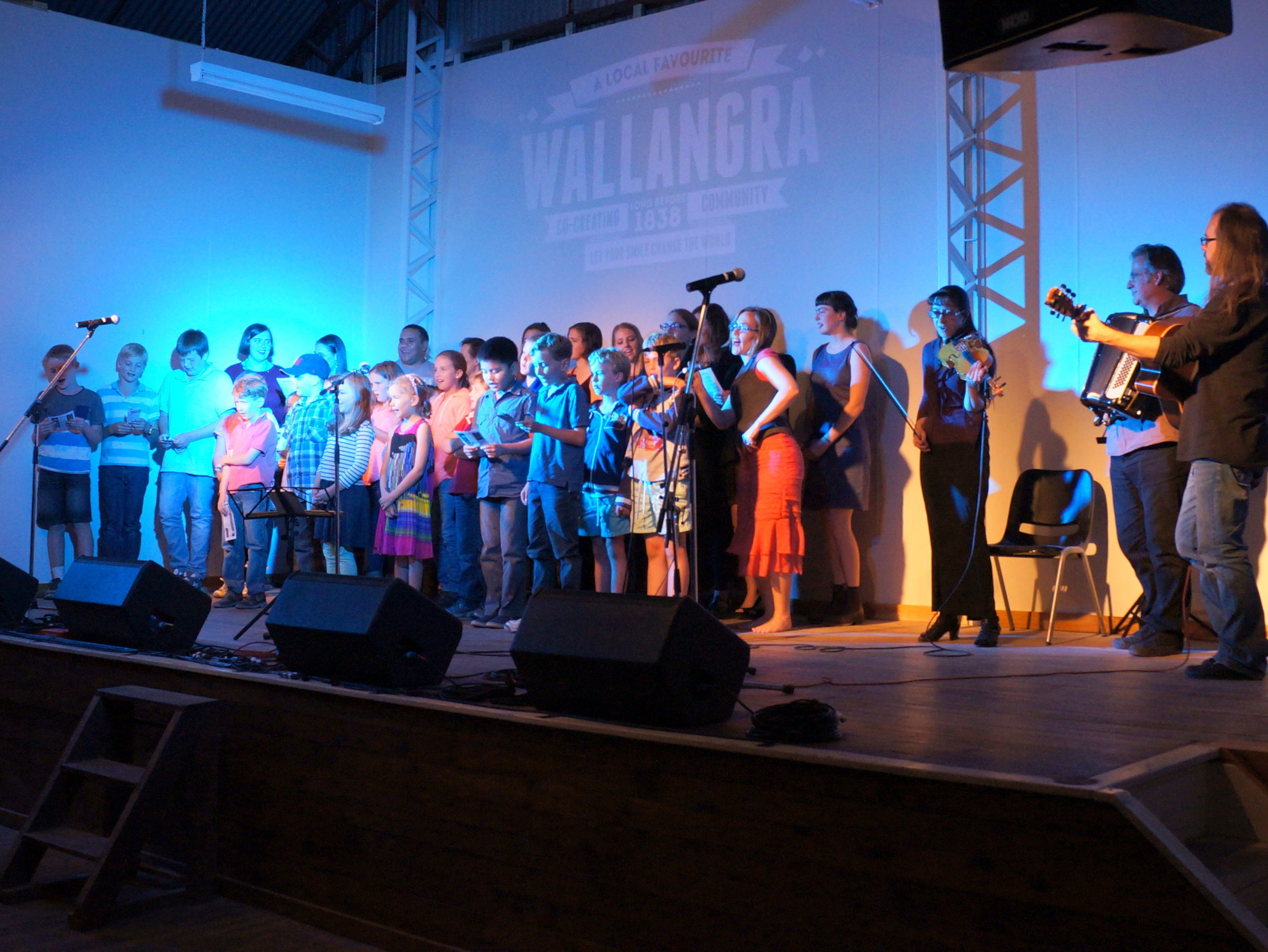
Festival demonstrates community resilience
The Wallangra Recreation Reserve Trust secured a $50,000 TTTT grant funded by the Yulgilbar Foundation to run the ‘Not Quite Baroque (Broke!) festival in Wallangra, 650 km north of Sydney in northern New South Wales. The two-day event celebrated the resilience of several small bush communities, involving a series of creative art and music workshops for local school children, workshops for adults and a music concert for the whole community.
The Inverell Times reported that the money was used to transform the Wallangra Hall into a fresh performance venue, triggering a series of art and music workshops, host a TED talk series and put on a concert of immense local talent.
A positive outlook for the future
The festival has now been declared inaugural, with all organisers and participants firmly committed to making this happen next year.
Event co-founder Helen McCosker felt the community had been energised and encouraged pursuit of events to re-invigorate people.
“They just need to come together and really work out a real plan, and real way of pushing their community to a point that there needs to be changed, and it needs to happen,” she said.
“And it can be done; it’s all possible. And we did it. It’s amazing. And we’ll keep doing it.”

